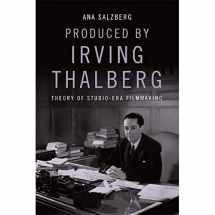
Produced by Irving Thalberg: Theory of Studio-Era Filmmaking
Book details
Summary
Description
Explores Irving Thalberg's importance as not only a producer, but also a theorist of studio-era filmmaking
- Offers a critical reappraisal of Thalberg's legacy
- Provides in-depth analyses of Thalberg's productions at MGM from 1924 through 1936
- Examines Thalberg's impact on film-historical turning points, including the transition to sound cinema and the development of the Production Code
Irving Thalberg was not just a critically important producer during Hollywood's Golden Age, but also an innovative theorist of studio-era filmmaking. Drawing on archival sources, this is the first book to explore Thalberg's insights into casting, editing, story composition and the importance of the mass audience from a theoretical perspective. It examines Thalberg's impact on film-historical turning points, such as the transition to sound cinema and the development of the Production Code, and features in-depth analyses of Thalberg's productions at MGM from 1924 to 1936, including films like The Big Parade (1925), The Broadway Melody of 1929 (1929) and Romeo and Juliet (1936). The book argues that Thalberg's views represent a unified conceptual understanding of filmmaking - one that is still significant in the modern day.


We would LOVE it if you could help us and other readers by reviewing the book
Book review



